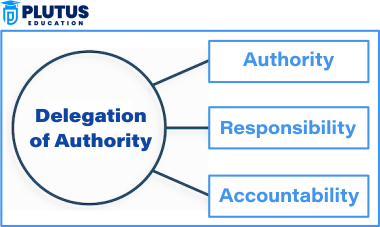The elements of delegation are the foundation of a successful management system. The act of delegating assigns responsibility and Authority from a superior to a subordinate while the superior remains accountable. That is to say, Delegation effectively distributes work, reduces workload, and ultimately increases Efficiency. The elements of Delegation include Authority, responsibility, and accountability. These three elements ensure that things are correctly accomplished and the organisation’s objectives are achieved. A company might become inefficient and not well managed without proper Delegation. This article focuses on the concept of Delegation in management, its importance, and its contribution to adequate business flow.
What is Delegation of Authority?
Management refers to the process whereby a manager delegates specific tasks, decision-making authority, and responsibilities to subordinates while being accountable for everything. This gives the managers more time to attend to their jobs’ core functions while ensuring the employees improve their skills and can complete assigned tasks correctly.
Definition of Delegation of Authority
The systematic process of assigning tasks, providing the necessary resources, and granting decision-making rights to subordinates while ensuring accountability. It is a structured way of dividing work to increase operational Efficiency in an organisation.
Example: In a corporate setting, the department manager might delegate the task of preparing the monthly reports to the senior employees in the organisation. This also saves the manager’s workload and allows subordinates to build analytical and leadership skills.
If correctly done, the Delegation improves teamwork, increases Productivity, and develops a robust management system in an organisation. It helps the employees gain experience in handling responsibility independently, which makes them more ready for future leadership positions. In addition, Delegation strengthens organisational Efficiency by allowing each level of management to focus on their primary tasks.
Elements of Delegation
There are three bases for effective delegating of jobs in an organisation. All Managers must know those three elements of Delegation. Thus, the following are the elements of Delegation:
- Authority – The power granted to make any decision.
- Responsibility: Being obligated to ensure work is delivered.
- Accountability– Being charged with responsibility or liability for deliverables.
These elements of Delegation of Authority make the process of Delegation stable and efficient. All those elements help one keep discipline and work Efficiency alive. One cannot delegate responsibility without Authority, and the subordinate has to be answerable for the work he receives.
There are three main elements without which the Delegation cannot operate. Without sufficient Authority, the employee cannot perform a single task, and employees can not take care of their tasks seriously without accountability. There must be a balance between Authority, responsibility, and accountability for the smoother operation of any business.

Authority: The Power to Make Decision
Authority is the first element in the delegation process, where power or the right to decide and complete assigned work is granted to a subordinate. When delegating work, the manager should ensure the employee has all the Authority necessary for their execution. Important decisions cannot be made without appropriate Authority granted to the employees, leading to delays and inefficiency.
Subordinates should be taught the limits of Authority so they do not misuse their powers. Authority and responsibility go hand in hand. If a manager asks an employee to handle customer complaints, they should also be given the Authority to offer discounts or refunds.
A clear-cut hierarchy will ensure Authority flows from top management to lower levels. All levels of management should have defined Authority, so there is no confusion and conflict. If managers do not delegate Authority properly, employees feel frustrated and demotivated.
Authority can be classified into two types:-
- Formal Authority – Given by an organisation’s structure, such as a supervisor’s Authority over their team.
- Without an official title, informal Authority is gained by skill, experience, or leadership.
Proper Delegation of Authority makes the organisation work effectively. Decisions are made on time, and staff members can work independently and carry out their jobs.
Responsibility: Obligation to Perform Tasks
The second constituent element of Delegation is responsibility. This refers to the task entrusted to an employee. It dictates what the subordinate needs to do and keeps the person committed to work. Responsibility always flows from top to bottom because it is work given by superiors to their inferiors.
A subordinate needs to take up responsibility with free will. Employees will not work efficiently if the duties are unknown to them. Managers should thus communicate the job expectations so the employees understand their roles and responsibilities.
Responsibility should be commensurate with Authority. It would be hard for the individual to be given massive responsibility without much Authority.
Example: If a marketing executive were tasked with launching the campaign but would not be allowed to approve the budget for the same, then it would result in delay.
Managers should assign responsibility with care. Overwork can overwhelm employees, while underwork can make them feel unimportant. A balanced workload ensures that employees stay productive and motivated.
An organisation should have a well-defined responsibility chain. Employees should know who they report to and what their exact duties are. This clarity reduces confusion and ensures smooth workflow within the company.
Accountability: Answering for the Results
Accountability is the last element of Delegation, whereby employees are answerable for their assigned work. That means the employees must take responsibility for their work and report their progress to managers. Even though the tasks are delegated, the superior remains ultimately accountable for the job done.
Accountability makes the employees responsible for their work. When a task is not done, the delegation subordinate must give reasons for it. This type of system makes employees committed and complete tasks proficiently.
The managers should communicate performance expectations to give employees a clear idea of what is expected of them. Monitoring time after time will check progress and highlight problems even before they become significant issues. Managers should also provide feedback and support to the employees to improve their performance.
The accountability process is top-to-bottom. The Authority and responsibility flow downwards, but accountability flows upwards. Employees report upwards to their managers, who then report to the superior authorities.
Accountability ensures that delegation does not become careless. It means that the employees must know their work and deliver the expected results. Accountability helps to keep discipline strong, improve performance, and assist an organisation in meeting its objectives without neglect.
Importance of Delegation of Authority
The importance of delegation of Authority is efficiency, increasing the employees’ sense of empowerment, and allowing the manager to focus on strategic goals. Several benefits are reaped in an organisation that practices effective Delegation.
Improves Efficiency
Delegation reduces the burden on management since they focus more on essential tasks. Delegationrkers are allowed to take care of routine work, thereby increasing Efficiency. When work is spread evenly, organisations operate in an orderly manner. The employees can handle the tasks assigned to them with delegation training. This means achieving deadlines and maintaining quality.
Encourages Employee Development
Delegation of Authority enables employees to learn. They become exposed to decision-making, problem-solving, and leadership. This way, they help grow their careers and professional development. The more employees receive tasks, the more they believe in their skills. Organisations that give their employees an opportunity to grow build a better workforce.
Improves Productivity
The completion of tasks is fast when managers delegate work effectively. Higher Productivity and performance by the organisation result from this. Employees work effectively when they understand their roles clearly. Delegation eliminates unnecessary delays in decision-making. A well-delegated system ensures that no individual is overburdened.
Teamwork and Trust Development
Delegation gives rise to responsibility and trust within a team. The employees will feel valued and motivated to contribute more effectively. Trust between the managers and the employees creates a positive working environment. The employees are made to take the initiative in their roles. A trusting workplace leads to more cooperation and job satisfaction.
Prepares Employees for Leadership Roles
Employees develop skills necessary for future leadership positions by handling delegated tasks. It creates a pipeline of capable managers within the organisation. Leadership skills such as problem-solving, decision-making, and communication improve through Delegation. Organisations that delegate effectively build a future-ready workforce. Employees who gain leadership experience through Delegation can confidently take on higher responsibilities.
Elements of Delegation FAQs
- What are the elements of Delegation?
Authority, responsibility, and accountability are the elements of Delegation. Work will be done efficiently through these three factors. The delegation will perform their duties to the fullest extent. Management has to have a balance between these three so that workflowDelegationthly.
- Which of the following is not an element of Delegation?
Motivation and leadership are essential for management but are not the primary compDelegationdelegation. The three essential elements persist: Authority, responsibility, and accountability.
- What is Delegation?
Delegation refers to an action that assigns a job to an individual below and gives them adequate Authority for their subordination. It will be relevant and answerable if it is satisfactorily completed. It will facilitate the distribution of worDelegationease the organisation’s Efficiency.
- How does Delegation of Authority benefit an organisation?
Delegation of Authority saves time, increases employees’ responsibility, develops decision-making, and ensures the proper utilisation of time. It helps managers concentrate on extensive work while employees handle day-to-day work.
- What are the three elements of Delegation?
The three elements of Delegation are Authority: Delegation right to decide., Responsibility: The onus of task fulfilment. Accountability: Duty of accountability.


